
You, The Beekeeper
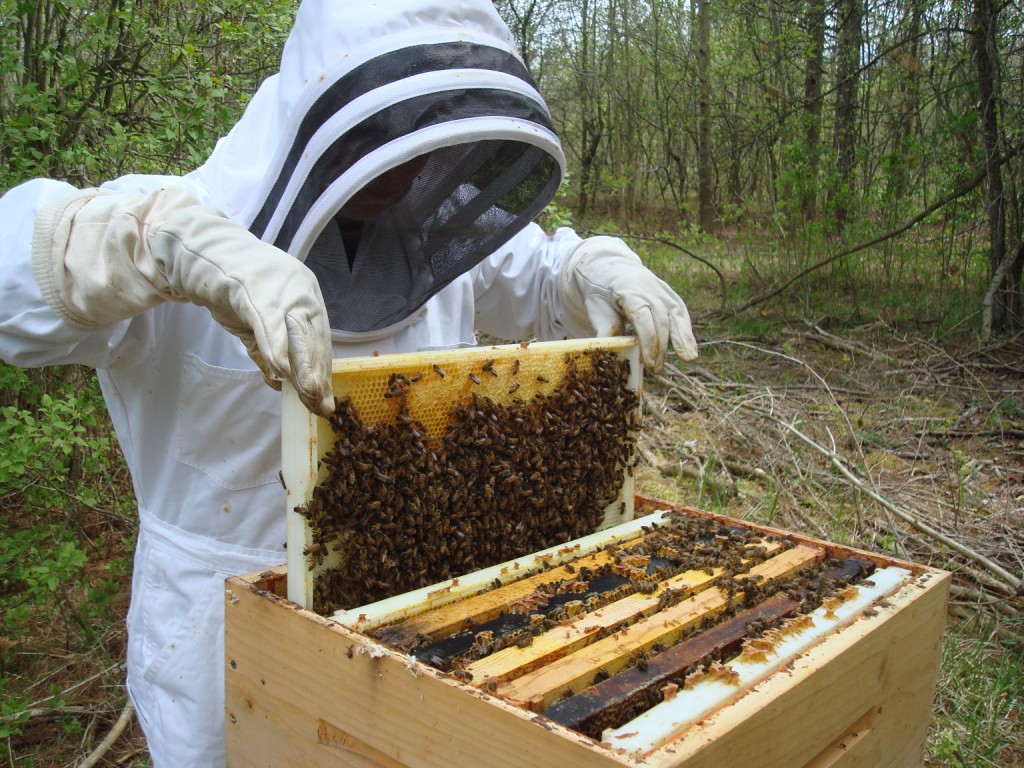
So, what's with all the buzz about bees? Well, over the past decade, bees and other pollinators have witnessed a steady unprecedented decline. The reason is because of Colony Collapse Disorder. Contributing factors to the mass disappearance of bees include: decreasing amounts of wildflower fields, climate change, increased pesticide use in agriculture, monoculture planting techniques, pests, diseases, and many others.
Foraging on flowers is a hard life for bees. Traveling large distances to collect pollen and nectar from sometimes hard-to-find flowers and then returning to the hive is a very demanding task both energetically and cognitively. To do this, bees need finely tuned senses, spatial awareness, learning and memory.
Anything that damages such atuned skills can make bees struggle to find food, or even get lost while trying to forage. A bee that cannot find food and make it home again is as good as dead.
Modern agriculture has created a non-hospitable environment for bees and other pollinators. Diesel fumes, neonicotinoid pesticides, herbicidides, and other chemicals become sublethal stressors that damage the bees' cognition.
This is how the hives are collapsing at such large rates. Bees go out to forage, come across these toxins in the environment and then get lost, not knowing how to get back home.
Where there is a problem, there is a solution. There is now a sudden and growing interest in backyard, rooftop, and urban beekeeping. Even as a small-scale beekeeper with only a few hives, you can play a valuable and crucial role in fighting honey bee colony decline. Every small action makes a big difference.
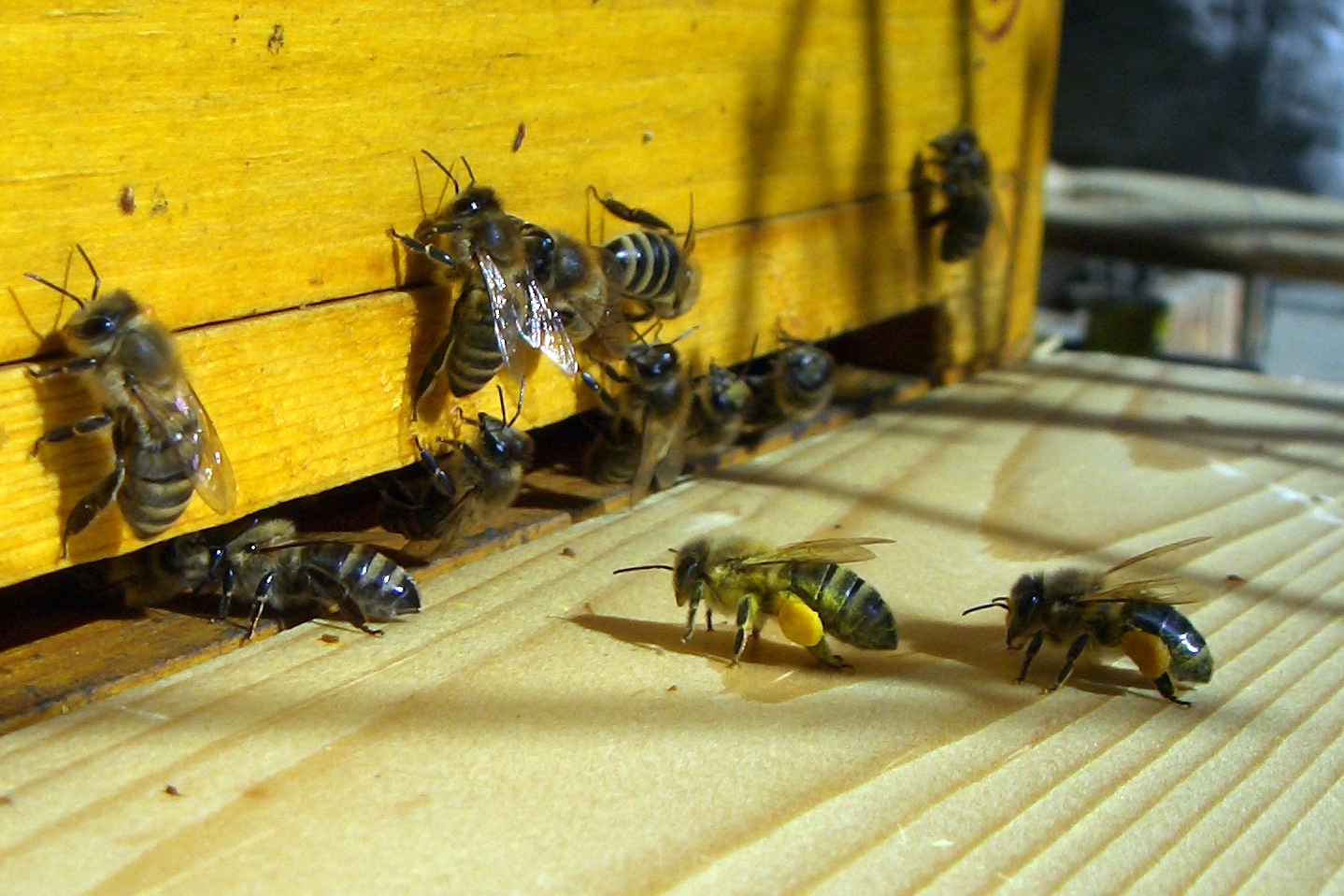
Why Keep Bees?
There are many reasons for becoming a beekeeper and each beekeeper has their own unique reasons for starting. Know your reasons and use them to guide you to the most practical and sustainable ways of maintaining your hives. Raising bees is becoming more and more popular by the day. It is an interesting hobby with tons of benefits.
If you want some backyard hives, keep in mind that you don't need to manage your hives like a commercial beekeeper. Commercial beekeepers with hundreds of thousands of hives need to run them like a factory; backyard beekeepers do not.
Only you can decide what draws you into beekeeping, but here are our top reasons for starting beekeeping:
1) Sweet Rewards
On top of having the benefit of interacting with these fascinating insects and helping them thrive, the various by-products of a hive are a major bonus to keeping bees.
The main bee products that are used for human consumption are:
-
Honey:
 Liquid Gold. Bees make honey to feed themselves during the winter. It is their food. When honey bees forage, they suck the nectar from flowers and store it in a stomach-like organ called a "honey-crop". When the bee returns to the colony, another bee takes the nectar and spreads it over the wax honey comb to help water evaporate. The second bee also adds an enzyme called invertase to help break down the sugar molecules. Once it becomes thick, it is sealed in a cell with a wax cap. Raw honey contains many beneficial minerals and vitamins. It also has antibacterial properties and antioxidant benefits. Many claim allergy relief by using local honey that contains pollen.
Liquid Gold. Bees make honey to feed themselves during the winter. It is their food. When honey bees forage, they suck the nectar from flowers and store it in a stomach-like organ called a "honey-crop". When the bee returns to the colony, another bee takes the nectar and spreads it over the wax honey comb to help water evaporate. The second bee also adds an enzyme called invertase to help break down the sugar molecules. Once it becomes thick, it is sealed in a cell with a wax cap. Raw honey contains many beneficial minerals and vitamins. It also has antibacterial properties and antioxidant benefits. Many claim allergy relief by using local honey that contains pollen. -
Bee Pollen:
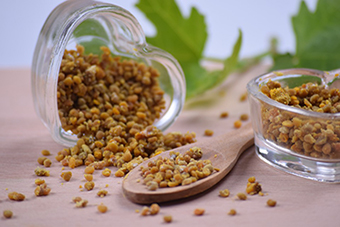 Pollen produced by bees is not the same as allergy-causing pollen that is carried by the wind. Honey bees collect this male seed part of a flower blossom and then it gets mixed with the bees' digestive enzymes. Check out the many health benefits of bee pollen.
Pollen produced by bees is not the same as allergy-causing pollen that is carried by the wind. Honey bees collect this male seed part of a flower blossom and then it gets mixed with the bees' digestive enzymes. Check out the many health benefits of bee pollen. -
Bees Wax:
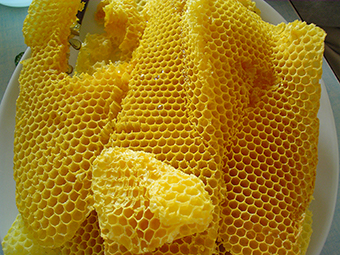 This is a natural secretion from bees' wax glands on the side of their bodies. It is used primarily as a building block for the bees' honeycomb cells in which the young are raised, and honey and pollen stored. To stimulate the production of beeswax, the honey bees feed themselves with honey and huddle together to raise the temperature of the cluster. After you extract your honey, keep the leftover honeycomb bees wax so you can use it for all kinds of great uses around the house and garden. Click here to read more about the uses of bees wax.
This is a natural secretion from bees' wax glands on the side of their bodies. It is used primarily as a building block for the bees' honeycomb cells in which the young are raised, and honey and pollen stored. To stimulate the production of beeswax, the honey bees feed themselves with honey and huddle together to raise the temperature of the cluster. After you extract your honey, keep the leftover honeycomb bees wax so you can use it for all kinds of great uses around the house and garden. Click here to read more about the uses of bees wax. -
Royal Jelly:
Royal Jelly is the queen bee's source of food. It is also fed to the larvae. However, more is given to the queen larva, causing her to grow larger than the other bees. It is a blend of digested pollen and honey and contains a high concentration of vitamins B5, B6, amino acids, minerals and proteins, and is believed to be a potent antioxidant and rejuvenating substance that promotes tissue growth, as well as muscle and cell regeneration. Learn more about the wonders of royal jelly. -
Propolis:
Honey bees collect sticky resins that ooze from the buds of some trees and conifers. After chewing them and mixing them with their saliva and other substances, Propolis or sometimes called sticky glue is formed. Propolis is of vital importance for the survival of the honey bees in the beehive. Not only does it protect them against diseases, it also helps fight against climatic changes, such as wind and cold. Because of its antibacterial, antifungal, antiviral, anti-inflammatory and antioxidant effects, propolis has been shown to have outstanding value for a wide variety of illnesses. It is also used in ointments for healing cuts and wounds.
2) Bees are Independent
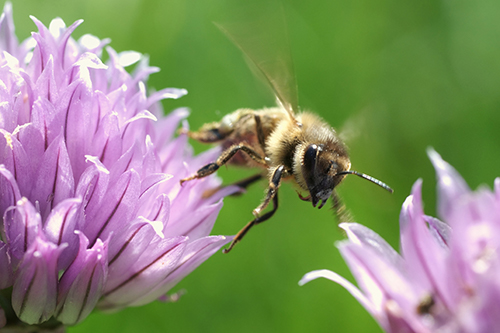
If you are thinking about getting a pet, such as a cat or dog, consider bees instead. They are independent, working and feeding themselves. In this sense they significantly differ from livestock and domestic pets.
Now, there will be times when you will have to open up the hive and work with your bees, such as when you split the hive for crowding purposes or when it's time to extract the honey, but during the rest of the times, the bees will take care of themselves. Your job as beekeeper is to provide a home for the bees and care for them, making sure all is well inside and outside the hive.
The bees do most of the work. As Chase Emmons, a master beekeeper at Brooklyn Grange says, "The barrier of entry is rather low: no need for a lot of space. Like with chickens, no need for constant attention."
3) Beekeeping is for Everyone
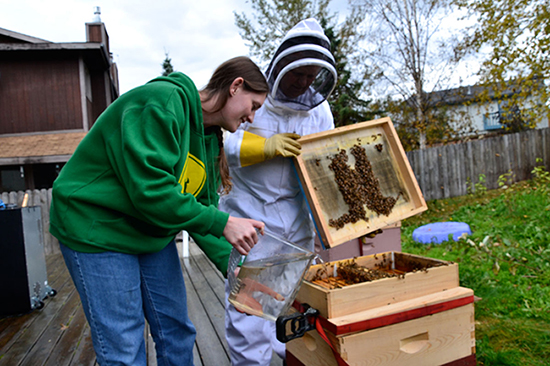
Anyone can be a beekeeper. If you've got an inkling to try it out, do it! Beekeeping is a great hobby with small startup costs and is not overly time and labor-demanding - assuming you are beekeeping for fun and pleasure.
Also, how amazing is it that with beekeeping as a hobby, you can make some money from surplus bee products? It is rare to find a hobby that is both pleasing and at least slightly profitable at the same time. Many hobbies drain our wallets rather than fill them.
Keeping bees is a great activity to practice, providing lots of family fun and it's a fantastic way to connect children with a natural phenomenon.
Anyone can practice beekeeping, including:
- The young or old
- Those living in remote, rural settings
- Those living in the heart of a city
- Residents of a wide variety of climates
- The fit and active
- People with limited mobility
- People with a busy lifestyle
- Retirees
4) Bee Educated
Beekeepers are always working to understand their honey bees. Beekeepers observe their bees working together as a superorganism and often beekeepers remark that even after working with bees for many years, they still learn something new every day.
5) Bees are Happy Everywhere
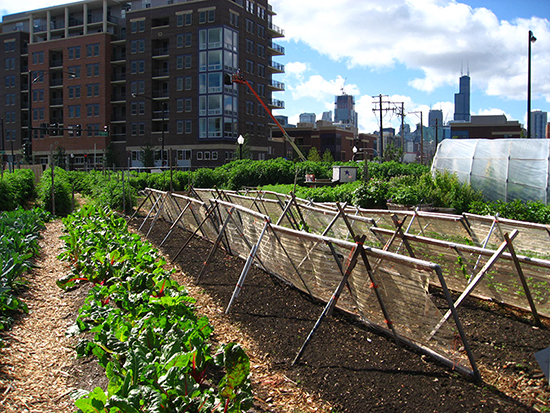
Bees can be kept almost anywhere; they do not have to be in a "perfect" spot. You can keep bees anywhere you would have a garden. Read about suggestions and guidelines that are best to follow when setting up and placing your hives.
No matter where you live, you can probably keep bees. You will have to check local ordinances of course. Other than that, there are no limits.
6) Help Save the Bees
Bees are in trouble right now - from pesticides, industrial farming, pollution, parasitic mites and viruses - and we need all the 'natural' beekeepers we can get to build up their numbers and give them a chance to solve their own problems.
By working together to build bee populations and preserve habitat, we can help the current bee population while learning more about the threats that face a species we all depend on.
More people need to get involved and stand behind the movements that will help bring this decline to a halt. States need to take action, as Maryland is attempting, to eliminate harmful pesticides like neonicotinoids that have been shown to pose major threats to the bee population. It's time that we work together to #SaveTheBees, before it's too late.
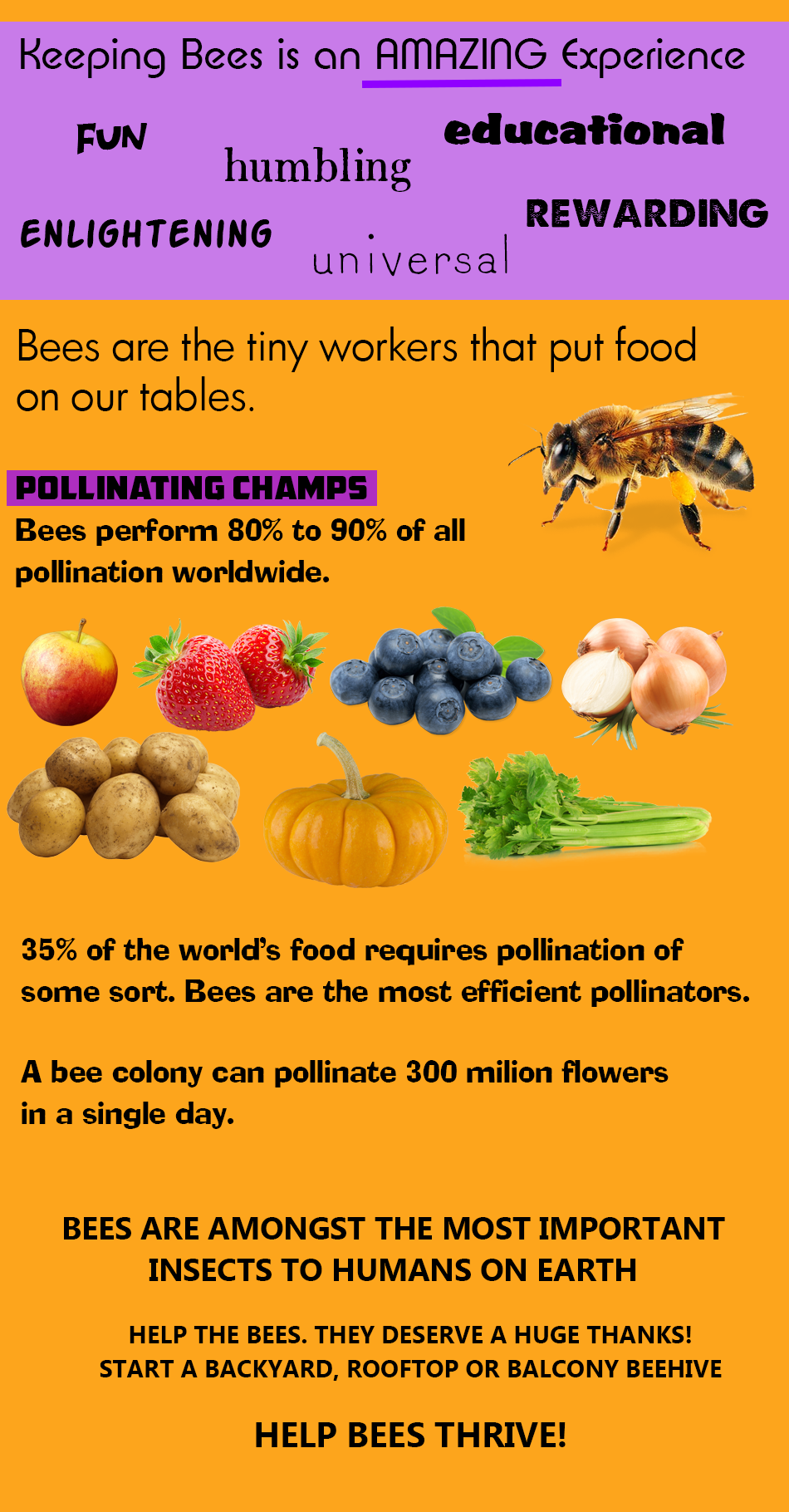
Sources:
One Third of Our Food Depends on Pollinators
Pollinators Need You. You Need Pollinators.
Honeybees, Beekeeping, and Bee Products in our Daily Lives
Honey Bees and Their 7 Wonderous Products
Neonicotinoids Linked to Wild Bee and Butterfly Declines in Europe and US
Colony Collapse: 10 Years After the Crisis Began, What is Happening to the World of Bees?
16 Reasons Why Beekeeping is Awesome
How to Start Beekeeping for Free
Why All the Buzz About the Bees?
Why Bees Are Happy to Work in the Big City

